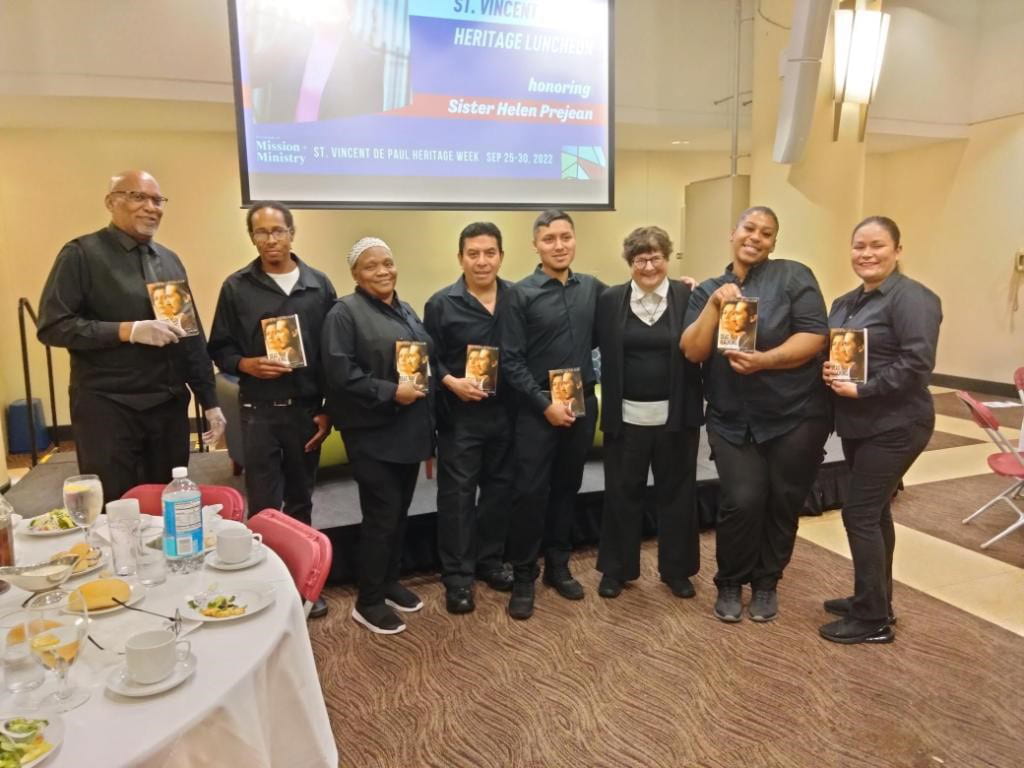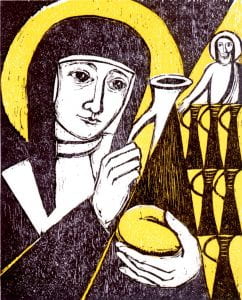
“Just say a word where you see it’s needed.”[1]
On September 28, Sister Helen Prejean, CSJ, the internationally acclaimed anti-death penalty advocate and author, was awarded DePaul University’s highest honor, the Saint Vincent de Paul Award.
Before, during, and after the conferral reception, Sister Helen gracefully greeted guests, caught up with old friends, and gained countless new ones. She also made a point of delighting students, as they bustled through the sign-in, giddy with the hope of capturing a selfie with “the cool nun in that old movie about the death penalty.” Sister Helen eagerly welcomed them, wished them well with their academics, and told them to make sure they had fun at college.
Yet, that day, it wasn’t the general crowd that perhaps most captivated Sister Helen’s gaze. As I watched her work the room, there were distinct moments when she chose to pull herself away from the throng of admirers to position herself off to the sides or at the very back. Amid all the hustle and bustle of the grand occasion, it was in the peripheral shadows of the Loop concourse that Sister Helen created a quiet moment to seek out the library staff, who were otherwise hidden by the huge visual displays that had been meticulously prepared to showcase her work. She earnestly thanked them for their efforts. Then, without missing a beat, she made a beeline to greet the many serving staff who were hurriedly rushing in and out of the staging area, attentively replenishing plates and refilling unceasingly empty glasses.
As I watched this dynamic religious sister, an undeniable social justice icon on the global stage today, I was enthralled by how her actions exuded a simple yet profound truth, the power of radical hospitality. As John J. Navone, SJ, once said in an interview, “The humanizing and personalizing power of hospitality is limitless.”[2] Indeed, genuine and radical hospitality are “possible only when persons know who they are, have a self to give, and are happy to share that self with others.”[3]
Saint Vincent de Paul and Saint Louise de Marillac’s lives were grounded in a similar wisdom. Their ministry was shaped by their response to such questions as “Who is in need and what do they need? Who among us are excluded? How can they be welcomed? Who among us are unheard and how do we help them to be heard?”[4]
We cannot know who may be need a kind word as we go through the busyness of our days. However, responding to the invitation to affirm the dignity of those in our midst through small acts of kindness is never a wasted moment.
Not all of us are called to be Sister Helen Prejean, Saint Louise, or Saint Vincent de Paul. Yet sharing a word of kindness with someone who may need it invites us all to create a more compassionate and loving world. Another world is indeed possible, and, if we create it with our hands, hearts and minds, it can happen within our midst.
What does radical hospitality mean in your everyday life and work at DePaul? What is an act of radical hospitality that has stayed with you? Why is this so?
Reflection by: Siobhan O’Donoghue, Director of Faculty/Staff Engagement, Division of Mission and Ministry
[1] Conference 85, “Service of the Sick and Care of One’s Own Health (Common Rules, Arts. 12–16),” 11 November 1657, CCD, 10:270. Available at: https://via.library.depaul.edu/vincentian_ebooks/35/.
[2] John J. Navone, SJ, Professor Emeritus of Pontifical Gregorian University in Rome, Italy. Personal interview (2010) quoted in Thomas A. Maier, PhD, “Preface: The Nature and Necessity of Hospitality,” Vincentian Heritage 33:1 (April 2016) [unpaginated]. Available at: https://via.library.depaul.edu/vhj/vol33/iss1/1/.
[3] Maier, “Preface: The Nature and Necessity of Hospitality.”
[4] Ibid.
Participate in DePaul’s Annual Gathering of Remembrance:
The DePaul community is invited to join the Division of Mission and Ministry for our annual Gathering of Remembrance, an interfaith memorial service for all community members who have lost loved ones over the past year. This service in Cortelyou Commons (and broadcast over Zoom) on November 17 at 4:30 pm invites us to stand together in mutual support and solidarity with our colleagues as the calendar year draws to its close.
We invite the entire DePaul community to please submit the names of loved ones for remembrance by end of day Tuesday, November 15 so that they can be included in the service. If you know of anyone who has lost a loved one over the last year, please share this announcement. We want to honor their memory. All are invited and encouraged to join us as we celebrate their memory and surround all those who have experienced loss with loving support.
Learn more and RSVP at: https://gathering-of-remembrance.eventbrite.com







